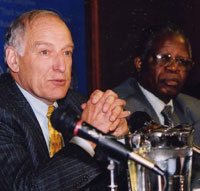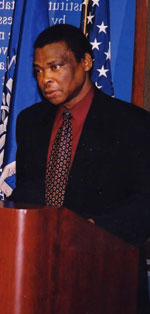What Future for Mugabe's Zimbabwe?
What are the possible consequences of a prolonged political deadlock in Zimbabwe? Are there viable options open to the international community to address the current humanitarian, economic, and political crisis there?

On January 29, the Institute hosted a Current Issues Briefing to explore the current crisis in Zimbabwe and possible avenues to peace. Moderated by Institute board chairman Chester Crocker, former assistant secretary of state for African affairs and current Schlesinger professor of strategic studies at Georgetown University, the briefing featured assistant secretary of state for African affairs Walter Kansteiner, Zimbabwean ambassador to the United States Simbi Mubako, Robert Rotberg of Harvard University's Kennedy School of Government, and Institute senior fellow and University of Zimbabwe professor Masipula Sithole.
A Country in Crisis
Recounting his experiences working on issues related to Zimbabwe over the past twenty years, assistant secretary of state Kansteiner said the promise seen in the early 1980s had yet to be fulfilled.
A nation that at first had showed a promising focus on good governance, literacy, and reconciliation now is confronted with hyperinflation and a massive humanitarian crisis, he said.
Walter Kansteiner and Zimbabwe ambassador to the U.S. Simbi Mubako
In addition to current inflation rates of 300-400 percent, currently less than 15 percent of workers in Zimbabwe are employed and half of the population is dependent on foreign food aid. Making this situation worse, Kansteiner emphasized, is an underlying political crisis that has left the people of Zimbabwe without the leadership needed to help the nation out of this crisis. Summing up the current crisis in Zimbabwe, he said that "the government of Zimbabwe does not have a plan."
After presenting a brief overview of how Zimbabwe's neighbors are handling the crisis, Kansteiner said he believed that other nations in the region such as South Africa are concerned and actively discussing the situation—even if largely behind closed doors. However, he felt that in regard to U.S. policy that the best option for the United States and the international community at present is to continue with strong multilateral sanctions—including a travel ban—against the Mugabe regime.
Understanding Zimbabwe's Challenges
Discussing the crisis from the Zimbabwean perspective, Ambassador Mubako stressed that Zimbabwe faced four primary challenges: the AIDS/HIV epidemic, drought and food shortages, a severe economic recession, and a diplomatic stand-off with the West. Of all the current problems facing Zimbabwe, Mubako said perhaps the most critical problem to address, besides the scourge of AIDS/HIV that is sweeping all of Southern Africa, is the food shortage. In searching for a solution to this problem, however, Zimbabwe and the international community must emphasize solutions that would address the current food shortage as well as prevent food shortages in the future. In particular, Mubako emphasized that attention must be given to four primary areas for long-tem food security in Zimbabwe:
- Increased food production during non-drought years.
- Better food storage facilities and capacity.
- Less reliance on foreign food and grain.
- Expansion of irrigation and dam construction.
Lastly, Mubako maintained that the current recession was being sustained by the economic sanctions imposed by the West and that only a combination of domestic measures and international investment could address Zimbabwe's economic problems. He also stated that although "problems" exist, political tensions could be resolved peacefully and did not constitute a crisis. To move this process forward, Mubako called on the leaders of the major political factions in Zimbabwe to enter immediate talks (perhaps mediated by an elder former African statesman such as Nelson Mandela) to ensure political stability in Zimbabwe. Mubako also called for the international community to pledge to support any agreements reached through the talks irrespective of the outcome.
The Tragedy of Zimbabwe
Noting that the situation in Zimbabwe is, "one of the main paralyzing questions about Africa" currently facing the international community, Harvard Africa scholar Robert Rotberg stressed that the crisis in Zimbabwe "is much closer to Côte d'Ivoire and Somalia than many people might think." Outlining the challenges to regional security posed by instability in Zimbabwe, Rotberg expressed his concern about a growing refugee problem and noted that the Mugabe regime was basically starving its own people. He also noted that neighboring states were concerned about being overrun by an ever-increasing wave of refugees. Unfortunately, he said the lack of leadership that South Africa has played in organizing Zimbabwe's neighbors to find a strategy to combat this impending humanitarian crisis is only making this situation more uncertain—a crisis that he feared could impact the stability of the entire region.
In examining options to stabilize Zimbabwe, Rotberg stressed that regime change was the only viable long-term solution. He also emphasized that Zimbabwe inherently has the human and natural resources needed to rebuild and rebound from this current crisis if it could be freed from the current regime. Rotberg also noted in closing that regime change need not come about through violence. Instead he suggested that an offer of immunity from the international community to convince Mugabe to step aside or even some type of intervention by South Africa (such as the imposition of sanctions) may be viable options for spurring regime change in Zimbabwe.
Finding a Way Forward
The last presenter at the briefing, Zimbabwean professor Masipula Sithole, stressed that the Mugabe regime has completely failed to take care of the Zimbabwean people—the primary mission, in his opinion, of any legitimate government. Stressing that regime change in Zimbabwe was of critical importance to the nation's future, Sithole stated that the international community and people of Zimbabwe must be honest about the state of affairs in the country today and that people "must not [attempt to] legitimize the illegitimate."
In offering a potential way forward, he suggested moving the presidential elections scheduled for 2008 up to 2005—to coincide with the parliamentary elections—along with soliciting a pledge from Mugabe not to run again. This, Sithole argued, appears to be a viable option that the military could be convinced to support and could potentially also stave off further civil unrest throughout Zimbabwe—a situation that he feared was in the offing.
The critical questions, he cautioned, were if Zimbabwe could last another three years under the current regime and if Mugabe could be convinced to step aside peacefully in 2005. Yet, while this road would be difficult, Sithole was optimistic that an appeal to Mugabe's better nature to step aside for the greater good of Zimbabwe could be successful and noted that "he did love them [the people of Zimbabwe] once and in the national interest he can love them again."
This USIPeace Briefing reflects the presentation and comments from "What Future for Mugabe's Zimbabwe?"—a Current Issues Briefing held at the U.S. Institute of Peace January 29, 2003. The views summarized above reflect the discussion at the meeting; they do not represent formal positions taken by the Institute, which does not advocate specific policies.
The United States Institute of Peace is an independent, nonpartisan institution established and funded by Congress. Its goals are to help prevent and resolve violent international conflicts, promote post-conflict stability and development, and increase conflict management capacity, tools, and intellectual capital worldwide. The Institute does this by empowering others with knowledge, skills, and resources, as well as by directly engaging in peacebuilding efforts around the globe.





